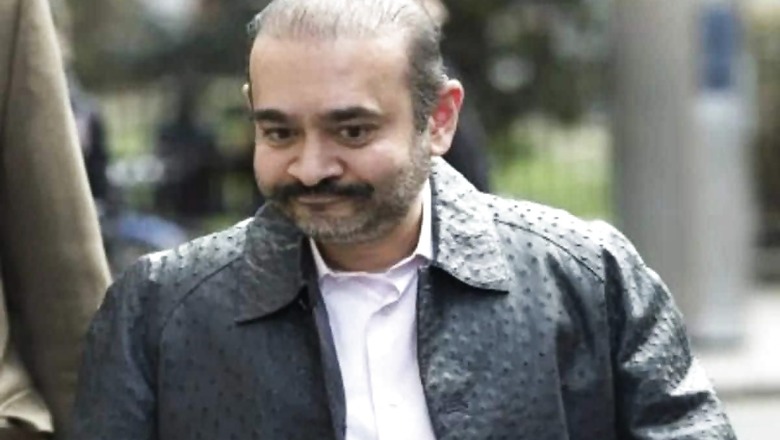
views
Fugitive diamantaire merchant Nirav Modi on Wednesday cited poor conditions of Indian jails and increased “risk” of depression that may lead to suicide as arguments in a fresh appeal against extradition in the UK.
Justice Martin Chamberlain presided over the “renewal application” hearing, held under the court’s COVID-19 video conferencing setting, and has reserved his judgment, to be handed down in writing at a later date, on whether to grant Nirav permission to appeal against his extradition ordered by District Judge Sam Goozee in February and certified by UK Home Secretary Priti Patel in April.
Modi’s lawyer said understaffing of doctors and overcrowding lead to delays in getting prisoners to hospitals when in need. He also cited Modi’s mental health risk and suicidal tendencies from the time his mother died by suicide when he was eight years old and systematic delays in getting psychiatric consultations.
Modi is likely to be at immediate risk of suicide if he is extradited, his lawyer argued that the event can trigger grave depression, which could lead to self-harm. Extradition must be refused for that reason, he said.
Acknowledging his right to have consultations with a psychiatrist of his choice in Indian prisons, Modi argued that approval for a visit would have to be taken from a judge based on their whims. Because of this, the permission might be severely delayed and may cause his condition to deteriorate. If the psychiatrist can get in into an overcrowded prison, there may be delays in giving him medicines by an overstretched staff, his lawyer said.
Arguing that private consultation has never been allowed in Arthur Road jail, Modi’s lawyer also cited a case in which a court denied permission for psychiatric evaluation. Due to the pandemic, the lawyer said getting a psychiatrist into the Covid-infested prison would be “difficult.”
“Covid-19 is rising in Maharashtra and is affecting this prison,” Modi said in his appeal. “The healthcare system is near collapse.”
Helen Malcolm, the Crown Prosecution Service (CPS) barrister appearing on behalf of the Indian authorities, argued against permission to appeal by reiterating that the expert evidence on Nirav’s mental health has not been disputed and that the regime awaiting him in Mumbai is based on assurances from the government of India of adequate medical care.
Such a high level of diplomatic assurance has never been breached, she said, a point also asserted by the counsel appearing on behalf of the UK Home Secretary. There is nothing to suggest that the speciality arrangements in place (under the UK-India Extradition Treaty) are not effective, said Rosemary Davidson, as she countered the defence team’s representations based around other Indian extradition cases involving former Kingfisher Airlines boss Vijay Mallya and alleged cricket bookie Sanjeev Chawla.
The fresh appeal against extradition comes nearly a month after Modi lost the first stage of his extradition appeal in the UK High Court. The UK High Court’s decision came after the wanted diamond merchant’s extradition to India was ordered by UK Home Secretary Priti Patel in the Punjab National Bank (PNB) scam case.
A high court official confirmed that the permission to appeal was “rejected on paper” on June 22, which left the 50-year-old jeweller with a chance for his lawyers to make his case at a brief oral hearing in the high court with a renewed “leave to appeal” application for a judge to determine if it can proceed to a full appeal hearing.
Choksi and his nephew Nirav Modi had fled India in the first week of January 2018, weeks before the scam in the PNB rocked the Indian banking industry.
Nirav Modi escaped to Europe and was finally held in London, where he is contesting his extradition to India, while Choksi took citizenship of Antigua and Barbuda in 2017, where he was staying since his escape from Delhi.
(With PTI inputs)
Read all the Latest News, Breaking News and Coronavirus News here.




















Comments
0 comment